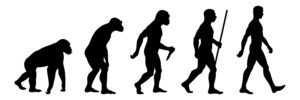Everyday Evolution & Male Fertility

Do you believe in evolution? Apparently, over 6 in 10 Americans do. Since described by Darwin over 150 years ago, every aspect of evolution has been, and continues to be, hotly debated. But what fascinates me most about evolution is not who runs the show, but how it actually might happen.
Microevolution
To many in the field, things called mutations are considered the raw material of evolution. Mutations are like misspelled words in your DNA: they read differently than correctly spelled words. Sometimes they make sense or even add new meaning and other times, they do not. Darwin’s term “Natural Selection” is not really change, it is the force that acts on change. Mutations are change.
Mutations have become far easier to look at over the last decade. Why? Because of very rapid advances in computing science, which have paralleled the tech industry explosion. Along with the ability to put the contents of an entire computer on a cell phone (oh, and add a couple of cameras), we now have the power to examine the human genome with ridiculous accuracy, similar to detecting a single misspelled word in a whole book. Even better, we can tell whether your mother or your father misspelled the word in the book. We’re talking a crazy amount of detail here.
Blame Your Father
What good is all of this informatics power when it comes to evolution? Simple. It allows science to trace genetic mutations from parent to offspring and determine what’s happening, who’s doing what, and how often. Here is something that has recently become clear regarding the transmission of brand-new mutations in humans: they are derived mainly from fathers and not mothers. In fact, fathers contribute 6 to 9 times the number of new mutations to offspring than mothers, depending on where you look in the genome.
Biological differences in the way sperm and eggs are made constitute the main reason men are responsible for the majority of mutations that occur with evolution. Whereas women are born with a lifetime’s worth of eggs, men generate new sperm every day. Sperm production loses its copy-and-paste precision with DNA as men age. As a consequence, a man’s sperm DNA harbors more and more mutations as he ages.
Teenage Fathers
But there’s more. Mutations in sperm get passed down from generation to generation. We also now know that the children of older fathers receive more mutations than those of younger fathers. This, in fact, is the basis for the postulated relationship between older fathers and higher rates of autism, schizophrenia and other adult diseases in their kids. But how young or old a father should you be to safely have kids?
A recent provocative paper suggests that even very young fathers are a significant source of genetic mutations in offspring. Scientists from Cambridge University studied the DNA of 24,097 parents and kids from Europe, the Middle East and Africa. They looked for new mutation rates between generations. The youngest father in the cohort was 12 years old and the oldest was 70 years at conception. You might think that when the “engine” of sperm production is brand spanking new in teenage boys that it would work much better than the worn-out engine of older men. But no. Even among teenage fathers, the relative mutation rates in offspring were 5 times higher than that of teenage mothers.
Testing for Mutations
In my practice, sperm testing is useful to analyze the number, shape, movement and viability of sperm to pinpoint or rule out potential causes of infertility. Given the rapid advances in genomics technology, I soon foresee couples being able to screen sperm for harmful genetic mutations before conceiving, and then checking for issues prenatally at IVF and avoiding disease by not implanting affected embryos.
So, guys, we are doomed to change the world, whether in our daily lives or through our reproductive habits. On the other hand, men are key agents of evolution. So, in the absence of any knowledge about how health affects the kinds of mutations you pass on, do your duty, take great care of yourself, and treat your body like a temple.









